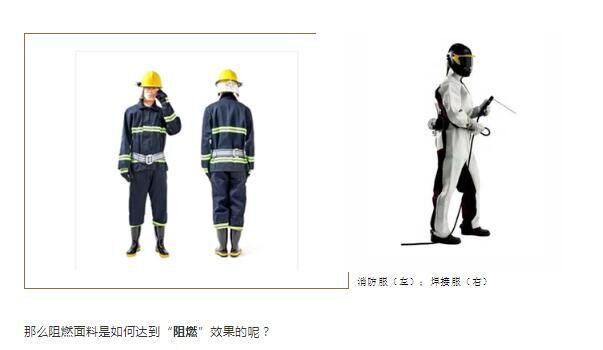Are flame retardant fabrics fabrics that cannot be burned?
The difference between flame retardant and high temperature resistance
Simply put, high temperature resistant materials can still maintain their original properties under high temperature conditions, such as wear resistance, sealing, etc. That is to say, under high temperature conditions, its chemical properties basically do not change, and at the same time, try to ensure that the physical properties do not change.
Flame retardant materials usually have the characteristics of not burning when exposed to flame, or not easy to burn, and extinguishing quickly after leaving the flame. For example, some polymer materials containing bromine and phosphorus can absorb the free radicals generated by combustion when burning. , hindering the chain reaction.
Are flame retardant fabrics fabrics that cannot be burned?
In fact, flame retardant fabrics do not mean that they cannot burn. After processing, the fabrics can prevent the spread of flames and automatically extinguish within a certain period of time.
Therefore, the flame retardant performance of fabrics is usually evaluated from the burning rate, burning time (afterburning time and smoldering time) and damage length of the fabric. That is, the shorter the flaming burning and flameless burning time, the greater the degree of damage. If it is low, the flame retardant performance of the fabric is better; on the contrary, it means that the flame retardant performance of the fabric is poor.
Related terms
Afterburning time: Under specified test conditions, the time the material continues to burn with flame after the fire source is removed.
Smoldering time: Under the specified test conditions, when the flaming combustion has terminated, or if it was a flameless burning, the ignition source is removed, and the time the material continues to burn without flames.
Damage length: under specified test conditions, the maximum length of the damaged part of the material in the specified direction.
Share high-quality courses directly with people who need them, and you can also get sharing commissions after others purchase the courses.
We all know that textile fabrics are flammable, and some work clothes for special types of work need to be flame retardant, such as fire-fighting suits, welding suits, etc.

Firefighting suit (left); welding suit (right)
So how does flame-retardant fabric achieve the “flame-retardant” effect?
1
flame retardant fabric
Flame-retardant fabrics refer to fabrics that, even if ignited by an open flame, can automatically extinguish within 2 seconds of leaving the open flame. That is, they will ignite when exposed to fire and cease immediately after leaving the fire, blocking combustion and preventing secondary damage. Flame retardant fabrics can be divided into finishing flame retardant fabrics and fiber flame retardant fabrics.
Flame-retardant fabrics can be divided into four categories based on the number of times they are washed: permanent flame-retardant fabrics, wash-resistant (more than 50 times) flame-retardant fabrics, semi-wash-resistant flame-retardant fabrics, and disposable flame-retardant fabrics.
1
Finished flame retardant fabrics
It is produced through coating and auxiliary treatment during dyeing and finishing, and is generally used to produce things that are not washed frequently.
2
GB 8965.1-2009 “Protective Clothing – Flame Retardant Protection Part 1: Flame Retardant Clothing” stipulates that the flame retardant performance of flame retardant fabrics is actually only one of the requirements for protective clothing. Flame retardant clothing is suitable for use in places where there are open flames, emitting sparks, operating near molten metal, and in places where there are flammable substances and there is a risk of fire. It is not suitable for flame retardant protective clothing worn in fire rescue.
1

Our country currently mainly uses GB/T 5455-2014 “Vertical Method for Textile Combustion Performance Testing” to test the flame retardant properties of textiles. The principle is to use the flame generated by the specified igniter to ignite the center of the bottom edge of the vertical sample. After the specified ignition time, measure the afterburning time, smoldering time and damage length of the sample. This method can be used to determine the flame retardant properties of various fabrics and products such as clothing, decoration, and transportation interiors.

Vertical combustion test chamber
GB 31701-2015 “Technical Safety Specifications for Textile Products for Infants and Children” requires the use of GB/T 14644-2014 “Determination of Burning Rate of Textiles in the 45° Direction” to test the combustion performance of infants and children’s clothing. The principle is as follows , under specified conditions, ignite the surface of the sample placed at an angle of 45°, and evaluate the burning rate of the sample based on the flame spread time. The ignition of the velvet sample and the base fabric is used as an additional indicator of the intensity of burning. This standard also applies to all types of fabrics and their products.
45° combustion test chamber
In summary, the market demand for flame-retardant fibers is increasing day by day. Chemical fiber companies must not only increase their efforts to develop new flame-retardant fibers, but also improve technology and equipment to improve the comprehensive quality of existing flame-retardant fibers to meet the needs of civilian, military and industrial applications. Application requirements for high-end flame retardant textiles.







